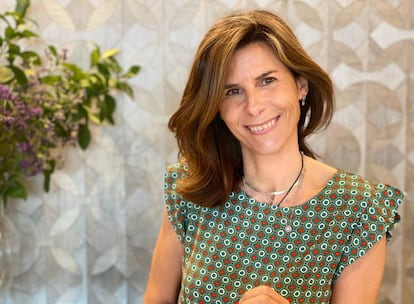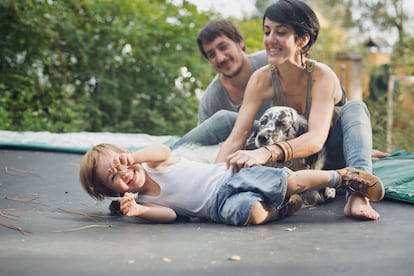Psychologist Diana Jiménez: ‘Don’t aim to constantly make your kids happy. Let them feel and grow from every emotion’
The therapist advises parents to instill values at an early age like respect, communication, responsibility and empathy


Diana Jiménez is a Spanish psychologist and therapist whose approach is based on the work of Alfred Adler, the Austrian medical doctor, psychotherapist and founder of the school of individual psychology. Jiménez recently published a book (available only in Spanish, Disciplina positiva. Cómo criar niños seguros, responsables y capaces) on how to raise secure, responsible and capable children. The book offers child-rearing strategies and information about the various stages of childhood and adolescence, with real-world examples, recommendations and strategies for parents. The aim is for parents to establish a strong connection with their children so they learn how to handle complex situations effectively.
Jiménez has over 20 years of experience with children and adolescents, and is a proponent of positive discipline. “Short-sighted approaches always fall short. Parents need to take action early to establish the foundations for their children’s futures,” she says.
Question. What is positive discipline and why is it important to apply it in parenting?
Answer. It’s a life philosophy that enhances personal relationships. Applying it in parenting is crucial, as positive discipline is rooted in Alfred Adler’s individual psychology, emphasizing that humans are naturally creative beings. This highlights our social nature and the importance of other people. Positive discipline guides us in building a value-based society that emphasizes respect, responsibility and empathy, which are often overlooked.
Q. What’s the message when you tell your kids that you’ll buy them a toy if they tidy up their rooms?
A. It’s basically a threat that makes a child follow orders without thinking — blind obedience. The child doesn’t think about why it’s good or respectful for themselves, for others and for society. It can result in submission, rebellion and a sense of inadequacy. It’s like saying, “I don’t trust you, so I’ll either threaten or reward you to get what I want.”
Q. Is it normal for a child to lie a lot or should parents be worried about that?
A. Lies tend to scare and worry us. We often overlook the role of lying in childhood and need to view it from the right perspective. Children under five don’t lie like adults. They interpret life through a magical lens, so their lies reflect how they wish things were or how they perceive them. Up to around age nine or ten, their desires or wants can be intertwined with lies. As kids enter pre-adolescence, they start elaborating, modifying and inventing lies to avoid consequences, and gradually start lying like adults.

Q. Can a parent be firm with a child without resorting to yelling or punishment?
A. Of course! It’s crucial for our mental well-being and that of our children that we keep learning and evolving. Discipline should be firm yet compassionate, emphasizing connection over correction. Yelling and punishment have no educational value.
Q. What happens when parents underestimate, isolate and overprotect their children to shield them from suffering?
A. It weakens the child. We often hear about the “glass generation,” right? These super-protected kids haven’t faced the consequences of their choices and end up feeling lost, making bad calls... Trying to shield our kids from pain is a mistake. Don’t aim to constantly make your kids happy — let them feel and grow from every emotion.
Q. Why do children misbehave?
A. Because they feel bad about something. The behavior is a clue to what may be happening. It’s only an expression of what your child is feeling. Your child wants you to see a hidden problem. It’s the same with adults — they behave badly when they feel bad.
Q. How can you properly connect with your child?
A. Sometimes we get stuck focusing solely on behavior. But kids are so much more than that. When we really connect with them, we’re not just addressing behavior — we’re connecting with the whole person. It’s about understanding where they are developmentally and how their brain works at that stage.
Q. How can you encourage and instill confidence with positive discipline?
A. Rudolf Dreikurs, a psychiatrist and educator, once said, “People need encouragement like plants need water.” We should focus on nurturing strengths with a growth mindset and a positive approach. It’s not just about saying a kid is great at everything, but about helping them grow by showing appreciation, giving guidance and staying connected.
Q. Are making agreements with young kids a good thing?
A. Very important for boosting healthy self-esteem. Parents need to take action early to establish the foundations for their children’s futures.
Q. You wrote that parents should figure out what they are going to do, rather than deciding what they’ll make their kids do. What does that mean?
A. Many times, we end up spending more time trying to control the kids than ourselves. If your child gets angry and starts yelling or feels like hitting you, instead of sending them to their room, let them know you’re going to step away from the fight. It’s about respecting yourself and not tolerating insults. By doing this, you’re teaching them the importance of self-respect and how to handle similar situations in the future.
Q. How do you make sure you’re not pretending your child is someone they’re not?
A. Let’s accept the child we’ve got. We might think we do this, but sometimes we end up telling them they could be more loving or cooperative, which really means, “I don’t like how you’re acting right now.” And occasionally, we catch ourselves making comparisons. If you want your child to blossom into their true self, support them in discovering their full potential. Be there to guide them on their journey. Be the safe haven they can always turn to and have faith that they’re exactly who they’re meant to be.
Sign up for our weekly newsletter to get more English-language news coverage from EL PAÍS USA Edition
Tu suscripción se está usando en otro dispositivo
¿Quieres añadir otro usuario a tu suscripción?
Si continúas leyendo en este dispositivo, no se podrá leer en el otro.
FlechaTu suscripción se está usando en otro dispositivo y solo puedes acceder a EL PAÍS desde un dispositivo a la vez.
Si quieres compartir tu cuenta, cambia tu suscripción a la modalidad Premium, así podrás añadir otro usuario. Cada uno accederá con su propia cuenta de email, lo que os permitirá personalizar vuestra experiencia en EL PAÍS.
¿Tienes una suscripción de empresa? Accede aquí para contratar más cuentas.
En el caso de no saber quién está usando tu cuenta, te recomendamos cambiar tu contraseña aquí.
Si decides continuar compartiendo tu cuenta, este mensaje se mostrará en tu dispositivo y en el de la otra persona que está usando tu cuenta de forma indefinida, afectando a tu experiencia de lectura. Puedes consultar aquí los términos y condiciones de la suscripción digital.








































